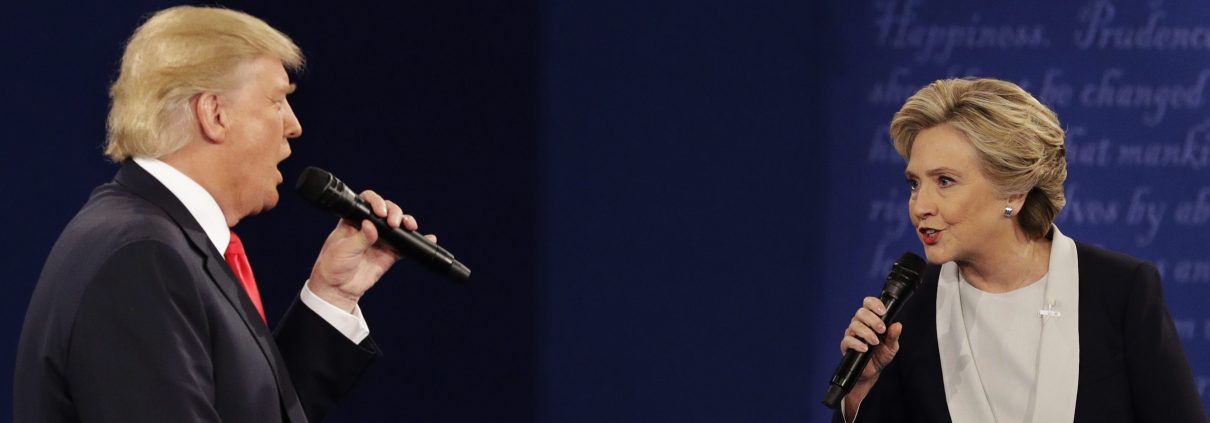The U.S. Presidential Election and Global Public Affairs: Beyond Wonkery and Demagoguery
By Michael Storper, Director of GPA, FCL of Global Processes and Institutions, Professor of Urban Planning
There are many ostensible differences between the view of Hillary Clinton and Donald Trump with respect to the global involvements of the USA and the global order in general. We could say that Trump is skeptical about the multilateral global governance system that has been constructed over the past 40 years or so. He questions the wisdom of trade agreements, arguing that they have hurt American workers. He questions the value of immigration, arguing that it too brings competition for American workers at home and a variety of risks for the social fabric and costs for the society. He questions America’s liberal internationalism, in the form of its commitments to NATO, the United Nations, the World Trade Organization, the recent Paris COP21 climate agreement and many other institutions. He believes that the Obama-Clinton team has been outmaneuvered by cleverer foreign leaders in the Middle East and generally believes that the United States is suffering a decline in prestige and power around the world, which he proposed to redress through a greater use of economic and military force.
And yet in both cases, it’s not entirely clear what a President Clinton or a President Trump would do in the many thousands of “little” decisions that would be made by their federal agencies in global public affairs. In both cases, we can expect a harder line toward the details of trade agreements, because the people have spoken on this issue, and scholarship has now piled up showing that, while trade and openness are generally extremely beneficial for our economy (and that of the world), we have been unsuccessful in mitigating its impacts for large parts of the workforce and helping them to share in global prosperity.
What would a President Trump do when faced with the decision to impose conditions on foreign aid to, for example, sanction countries that do not respect women’s or gay rights? It’s not clear, although he might be tempted to respond to his electoral supporters, which have a greater proportion of evangelical Christians than the Hillary Clinton camp. Beyond ideology, many gay rights activists in Africa have told us that aid conditionality actually led to more repression, rather than less. It is in these areas that millions of “small” foreign policy decisions are fought out, off the radar screen of the average voter.
What would either president do when the U.S. files cases in the WTO against trade partners – as it did successfully against Airbus recently – that help its domestic firm (Boeing) in the world market? In this case, a President Trump would quickly discover that the WTO is often rather helpful to American exporters. What would a President Trump do when our Justice Department uses American banking legislation (from a welter of legislation including the FATCA and Dodd-Frank) that enable successful prosecution of major non-American banks according to our laws, just because their transactions clear through our markets? Well, he might discover that, for the rest of the world, the U.S. is already seen as overreaching in the imposition of its domestic policies outside its borders. These kinds of highly technical decisions are also not on the radar screen of the big news headlines, and they presuppose focused participation in the international system of governance so decried by Mr. Trump.
Some of these observations sound like the classical claim by experts and technocrats that the practical, so-called real world of global public policy involves complexity that is immune to the simple nostrums that make up media-focused political debates. In this world, both Hillary Clinton and Donald Trump – the wonk and the populist – are hostage to innumerable constraints and compromises that will determine their international practice. This is obviously true, but completely unsatisfactory in a democracy. Policymaking and practice are full of detail, complexity and compromise, but most people also want to see some clear guiding principles and big purposes in them. The job for both political leaders and well-trained policy leaders (such as we hope to be training at GPA@Luskin) is to have an understanding of their principles, to be good practitioners, and to keep thinking about the link between the two, and to know how to communicate a sense of both big principle and highly developed practical governance skills to a concerned public. Neither pure wonk nor demagogue will suffice for this task. I’d say we need principled big think wonks.






Leave a Reply
Want to join the discussion?Feel free to contribute!